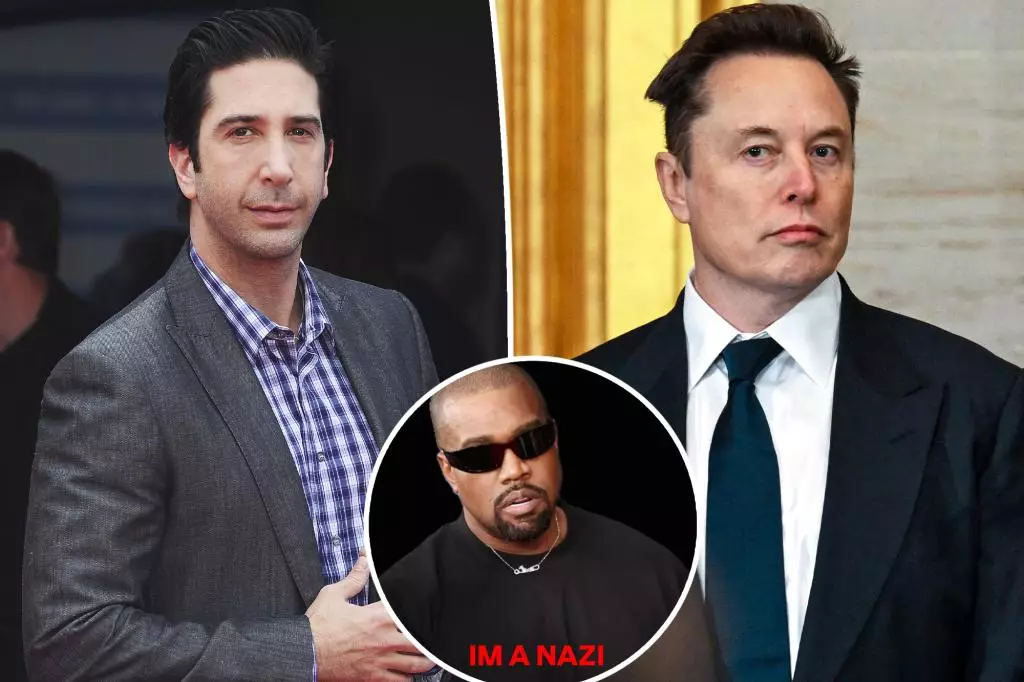In an age where social media platforms wield unprecedented power, incidents involving influential figures can have profound consequences. Recently, David Schwimmer, the iconic actor best known for his role in the beloved sitcom “Friends,” directed a heartfelt yet firm plea to Elon Musk, the owner of the platform X (formerly Twitter). This call came in response to provocative and deeply troubling statements made by Kanye West—an artist whose cultural impact is immense yet fraught with controversy. Schwimmer’s intervention highlights the urgent need for social media companies to demonstrate accountability in moderating harmful content, especially when it comes from individuals with substantial followings.
Kanye West, who has occasionally claimed notoriety for his candid remarks, has crossed a disturbing line with his latest posts, which included antisemitic sentiments and declarations of admiration for Adolf Hitler. The repercussions of such messages extend far beyond the digital realm, often inciting real-life violence against marginalized communities. Schwimmer articulated this issue starkly, referencing the alarming reality that West’s followers on X vastly outnumber the global Jewish population. This statistic serves as a cautionary tale about the capacity of hate speech to spread like wildfire, leading to societal fractures that cannot be easily repaired.
Types of Speech: The Distinction Between Free Speech and Hate Speech
Central to the discussion is the fine line between free speech—an essential cornerstone of democratic societies—and hate speech, which dehumanizes individuals based on any number of identity markers. Schwimmer’s assertion that “silence is complicity” resonates loudly in today’s context, urging individuals and organizations alike to not merely observe but actively combat the spread of hate. As West continues to leverage his platform for disseminating bigotry, one must question whether the duty of social media platforms extends only to providing a space for expression or also encompasses a responsibility for the safety and well-being of diverse communities.
Free speech advocates may argue that artists like West have a right to their opinions, no matter how controversial or offensive. However, the manifestation of such beliefs fosters an environment where hatred can flourish, disproportionally harming vulnerable groups. The ramifications of unchecked speech are evident in historical and contemporary societal issues; collectivities targeted by hate speech have often faced violence and discrimination, compelling observers to call for stricter regulations and preventive measures.
Choices, Consequences, and Cultural Responsibility
Moreover, Schwimmer’s response underscores a pivotal cultural moment. The entertainer did not merely condemn West’s rhetoric; he also addressed the lack of sufficient public outrage against such statements. This absence of response can be interpreted as a form of tacit endorsement, implicitly allowing figures like West to justify their reprehensible viewpoints with minimal backlash. It raises an important question about the collective responsibilities of public figures and the general populace in combating intolerance.
The responsibility also lies with corporate entities and social media platforms. Can they afford to remain complacent while users with significant platforms perpetuate narratives that risk inciting hatred and violence? As historical precedents have shown, silence in the face of hate speech can often embolden further acts of discrimination. The call for action from Schwimmer is not merely a critique of one celebrity’s actions but serves as an impassioned appeal to all stakeholders to scrutinize the content they engage with and amplify.
As the conversation around free and hate speech continues to evolve, Schwimmer’s plea to Musk is both timely and crucial. It signifies a movement toward increased accountability on social media platforms, underscoring the importance of proactive measures in preventing hate speech from gaining a platform. By shifting from passive observation to active engagement, the industry and society can challenge the narratives that threaten to divide us. We must ask: how can we foster a digital landscape that prioritizes empathy, understanding, and mutual respect over sensationalism and hate? In answering this question, we take a step toward healing and unity in a world that desperately needs both.


Leave a Reply